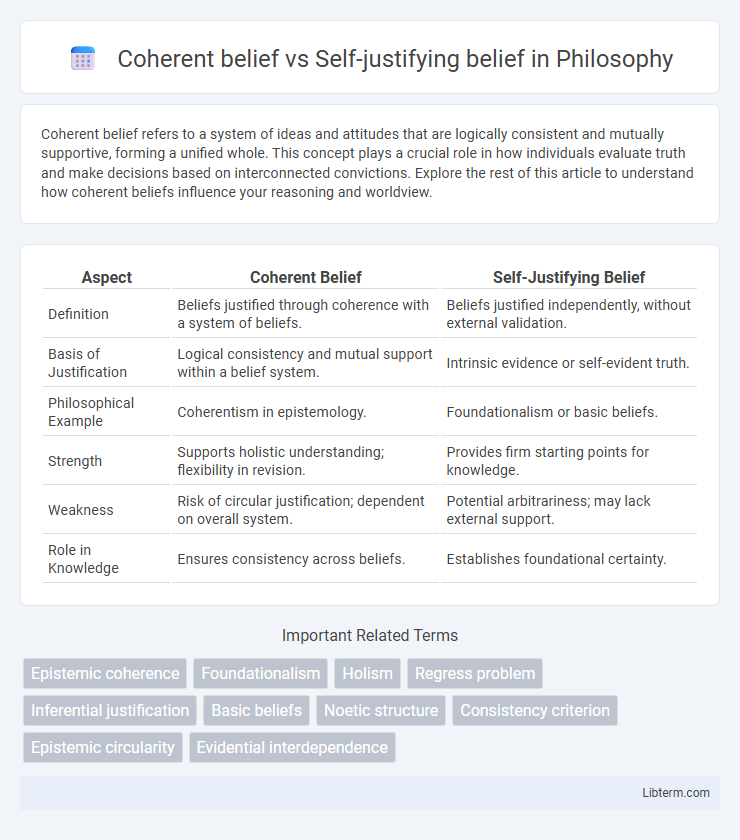Coherent belief refers to a system of ideas and attitudes that are logically consistent and mutually supportive, forming a unified whole. This concept plays a crucial role in how individuals evaluate truth and make decisions based on interconnected convictions. Explore the rest of this article to understand how coherent beliefs influence your reasoning and worldview.
Table of Comparison
| Aspect | Coherent Belief | Self-Justifying Belief |
|---|---|---|
| Definition | Beliefs justified through coherence with a system of beliefs. | Beliefs justified independently, without external validation. |
| Basis of Justification | Logical consistency and mutual support within a belief system. | Intrinsic evidence or self-evident truth. |
| Philosophical Example | Coherentism in epistemology. | Foundationalism or basic beliefs. |
| Strength | Supports holistic understanding; flexibility in revision. | Provides firm starting points for knowledge. |
| Weakness | Risk of circular justification; dependent on overall system. | Potential arbitrariness; may lack external support. |
| Role in Knowledge | Ensures consistency across beliefs. | Establishes foundational certainty. |
Introduction to Coherent and Self-Justifying Beliefs
Coherent beliefs form a consistent and interconnected system where each belief supports and is supported by others, establishing overall logical harmony. Self-justifying beliefs rely on their own internal reasoning or evidence to validate themselves without external confirmation. Understanding these concepts highlights key differences in epistemology related to belief justification and knowledge validation.
Defining Coherent Belief Systems
Coherent belief systems are defined by the logical consistency and mutual support among interconnected beliefs, ensuring that each belief aligns with and reinforces others within the system. These systems prioritize coherence over isolated justification, emphasizing the overall harmony and integration of beliefs rather than relying solely on foundational premises. Self-justifying beliefs, in contrast, attempt to validate themselves independently, often lacking the interconnected support characteristic of coherent belief systems.
Understanding Self-Justifying Belief
Self-justifying belief occurs when an individual holds a belief that is supported solely by the belief itself, lacking external evidence or independent justification. This contrasts with coherent belief, which derives support from a network of mutually reinforcing beliefs, creating an interdependent system of justification. Understanding self-justifying belief reveals the challenge of epistemic circularity, where belief validation depends intrinsically on the same belief, raising questions about the reliability and rationality of such convictions.
Core Differences: Coherence vs Self-Justification
Coherent belief relies on the logical consistency and mutual support among a system of beliefs, emphasizing how well individual beliefs fit within the whole network. Self-justifying belief depends on the belief itself as the basis for its justification, often without appeal to external evidence or coherence with other beliefs. The core difference lies in coherence requiring integration within a broader belief system, whereas self-justification centers on internal validation independent of external or systemic support.
Epistemological Foundations of Belief
Coherent belief systems emphasize the logical consistency and mutual support among a set of beliefs, forming an interconnected web where each belief justifies others within the system. Self-justifying beliefs rely on foundational beliefs that are accepted without external justification, serving as the epistemic bedrock from which other beliefs derive their validity. Epistemological foundations of belief scrutinize these structures to determine how beliefs acquire justification, highlighting the tension between coherence as systemic support and self-justification as foundational certainty.
Strengths of Coherent Belief Systems
Coherent belief systems excel in providing consistent and interconnected frameworks that enhance cognitive stability and reduce contradictions within knowledge structures. Their strength lies in the mutual support among beliefs, allowing for stronger justification through integration rather than isolated proof. This interconnectedness fosters adaptability and resilience in belief evaluation, promoting deeper understanding and justification.
Critiques of Self-Justifying Beliefs
Self-justifying beliefs face critiques for circular reasoning, as they rely on the belief itself as evidence without external validation. This undermines epistemic justification by failing to provide independent support, contrasting with coherent beliefs, which derive justification through mutual support within a belief system. Critics argue that self-justifying beliefs lack objective grounding, rendering them epistemically unstable and less credible compared to coherent belief networks.
Real-World Examples and Applications
Coherent beliefs form a mutually supportive network where evidence and principles align consistently, exemplified by scientific theories like climate change models that integrate diverse datasets for reliable predictions. Self-justifying beliefs rely on circular reasoning, often seen in ideological echo chambers where group assumptions reinforce themselves without external validation. In real-world applications, coherent belief systems enhance critical thinking and decision-making in fields such as law and medicine, while self-justifying beliefs can hinder progress by perpetuating misinformation and cognitive biases.
Implications for Rational Decision-Making
Coherent belief systems enhance rational decision-making by ensuring consistency among beliefs, reducing cognitive dissonance, and enabling more reliable predictions based on interrelated evidence. Self-justifying beliefs risk entrenching biases, as they rely on circular reasoning that can distort judgment and impede critical evaluation of alternatives. Prioritizing coherence over self-justification improves decision quality by fostering openness to revision and promoting alignment with objective evidence.
Conclusion: Evaluating Reliability and Truth
Coherent belief systems achieve reliability by ensuring internal consistency among propositions, fostering a unified worldview that supports mutual reinforcement of ideas. Self-justifying beliefs rely on circular reasoning, undermining their capacity to reliably attain truth due to lack of independent verification. Evaluating truth favors coherent beliefs, as their interconnected structure enhances epistemic justification and credence in factual accuracy.
Coherent belief Infographic

 libterm.com
libterm.com